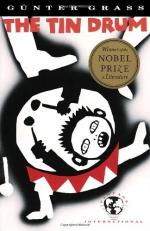|
|
The Tin Drum Chapter 10: Shopwindows
Oskar says he made a habit of spending time with his drum under rostrums until November of 1938, breaking up rallies and transforming marches into waltzes. Oskar maintains, however, that he was not a resistance fighter - "resistance" is a much-overused word. He prefers the reader to see him only as an eccentric who rejected the uniforms and colors of the mainstream.
Oskar learned to play the tempter from his grandmother Anna Koljaiczek. She came in from the country to Danzig each Tuesday for market, selling eggs, butter, and geese. Every hour a man who rented out hot bricks would push a brick under Anna's four skirts. Oskar envied those bricks, for he always wanted to be under his grandmother's skirts. He says:
"I was looking for Africa under those skirts, or perhaps Naples, which, as we all know, one must have seen before dying. This was the watershed, the union of all streams; here special winds blew, or else there was no wind at all; dry and warm, you could listen to the whishing of the rain; here ships made fast or weighed anchors; here our Heavenly Father, who has always been a lover of warmth, sat beside Oskar; the devil cleaned his spyglass, and the angels played blindman's buff, beneath my grandmother's skirts it was always summer, even when it was time to light the on the Christmas tree or to hunt for Easter eggs; even on All Saints' Day. Nowhere could I have been more at peace with the calendar than beneath my grandmother's skirts." Chapter 10, pg. 125-126
Seldom did Anna allow Oskar under her skirts. Oskar sat next to her and learned her tricks. She would tie string to an old pocketbook and throw it on the sidewalk. When someone picked it up, she would yank the string to embarrass them, then ask them to buy her wares.
Oskar had his own version of temptation: late at night he would slip out of the apartment and into town. He watched the people passing dark store windows, waiting for someone who seemed tempted by a certain object. Then he would sing out a section of the window with his voice, making a circular cut in the glass. He would watch as the person would slip the coveted object into their coat and move along. From November, 1936 to March, 1937, Oskar instigated sixty-four attempted and twenty-eight successful burglaries. The people, however, were not thieves by trade - the police either recovered the stolen items or the people returned them. Although Agnes and Alfred questioned him about the robberies from time to time, Agnes blamed Bebra's influence on Oskar as the reason for the thefts. Back in the institution, Oskar says it was evil that compelled him, though now he feels no compulsion toward temptation.
In January 1937, Oskar stood in a doorway across from a jewelry store in town. He saw Jan Bronski coming silent and alone down the street, and stop in front of the shop window, staring at a ruby necklace. Instead of drumming him away, Oskar sang a hole in the window for this man whom he presumed to be his father. Jan quickly picked up the necklace and put it in his pocket. Oskar drummed out "Father, father" on his drum and Jan came across the street and found Oskar in the doorway. Jan reached out to him and led him home; a few days later, Jan gave the necklace to Agnes. After WWII, Oskar traded the necklace for a leather briefcase and twelve cartons of Lucky Strike cigarettes on the black market.




